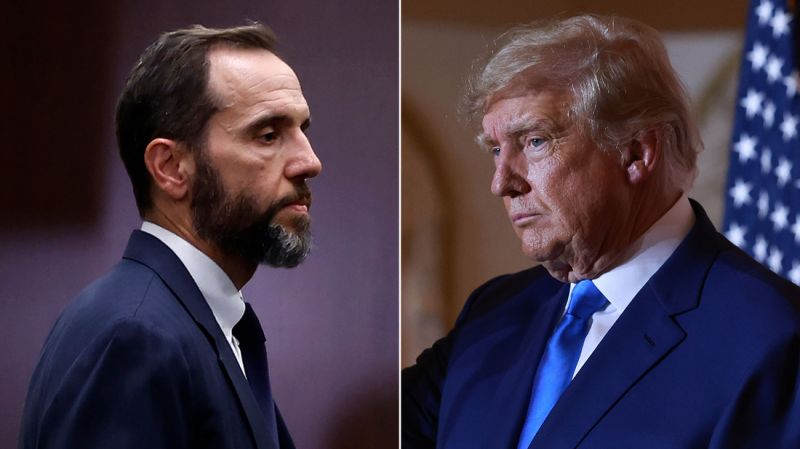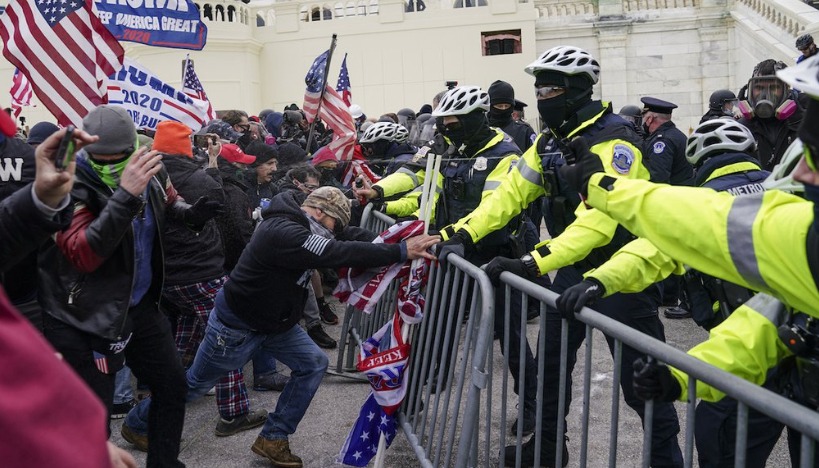US District Judge Likely to Delay Trial in Mar-a-Lago Classified Documents Case
US District Judge Aileen Cannon is considering pushing back the start of the trial in the Mar-a-Lago classified documents case. While federal prosecutors proposed a mid-December date, Judge Cannon expressed skepticism about arguments from Donald Trump’s lawyers that he couldn’t receive a fair trial while running for president.
A Compressed Timeline
During the hearing in Fort Pierce, Florida, Judge Cannon acknowledged that the prosecutors’ timeline was “compressed” and emphasized that cases like this require more time. She did not decide on a trial date but assured that she would promptly issue an order on the matter.
The First Appearance
Special counsel Jack Smith’s team and lawyers for Trump appeared in front of Judge Cannon for the first time. She will preside over the criminal case brought against the former president by Smith.
Pressing for a Timeline
Judge Cannon also pressed the Trump legal team to commit to a timeline for the pre-trial process. The defense attorneys stated that they believed they would be able to review enough discovery by November to suggest a potential trial date.
The Public Perception
An attorney for Trump claimed that the public viewed the special documents case as a showdown between a top 2024 contender and the administration of his chief political rival. However, prosecutor David Harbach vehemently denied this claim, emphasizing that the appointment of the special counsel removed any potential for political influence.
The Fair Trial Argument
Trump attorney Christopher Kise argued that the 2024 election and the resulting publicity would make it impossible to have a fair trial before the election. However, Judge Cannon appeared unconvinced, questioning whether the intense publicity would simply continue after the election.
Focus on Other Reasons
Judge Cannon advised Kise to focus his arguments on other reasons why the trial should not be expedited, such as potential legal issues or the complexities of handling classified information.
No Comment
After the hearing, Trump’s lawyers declined to answer questions about his target letter from Smith or the Mar-a-Lago classified documents case.
Stay Tuned
While Judge Cannon has not yet set a trial date, her inclination to delay the trial suggests that there may be more developments in this high-profile case.Trump’s Defense Strategy Revealed in Court Hearing
In a recent court hearing, former President Donald Trump’s defense team revealed their strategy to delay the case against him. The hearing, which focused on the handling of classified documents, shed light on Trump’s plan to push the trial beyond the 2024 election. Here are the key takeaways from the hearing:
1. Mundane Proceedings: Typically, hearings like this are mundane and focus on scheduling plans for handling classified materials. The substance of the documents themselves is not discussed.
2. Trump’s Absence: Trump did not attend the hearing, but his aide, Nauta, appeared with his attorneys. Nauta only spoke briefly to greet the judge.
3. Delaying Tactics: Trump’s defense team aims to delay the case, suggesting it may have to wait until after the 2024 election. They argue that the prosecutors’ timeline for resolving pre-trial disputes over classified materials is unrealistic.
4. Granular Questions: Judge Cannon had detailed questions about the discovery process and the amount of evidence the defense will have to review. She also questioned the comparability of previous cases cited by the prosecution.
5. Voluminous Discovery: Judge Cannon described the discovery as “voluminous” and emphasized that the defense team would want to review more than just the key parts of the video evidence identified by the prosecution.
6. Classification Review: The government completed a classification review of the documents and asserts that they have not been declassified. Trump’s team continues to characterize them as “purportedly classified.”
7. Clash with Justice Department: Trump’s defense attorneys have clashed with the Justice Department over the timing of procedural steps in the case. Prosecutors accused the defendants of stonewalling on a protective order for the classified discovery.
8. Scrutiny on Judge Cannon: Judge Cannon, a Trump appointee, will face additional scrutiny due to her previous ruling in a related case. Her decision to grant a third-party review of an FBI search was overturned by a conservative federal appeals court.
9. Educating the Court: The hearing serves as an opportunity for prosecutors to educate the court on the relevant law, which may be unfamiliar to many judges.
As the case against Trump unfolds, these developments shed light on his defense strategy and the challenges faced by both sides. Stay tuned for further updates on this historic federal prosecution.Discover the Latest Updates on Mueller’s Investigation into Trump’s Russian Links
As the investigation into the Trump 2016 campaign’s Russian links continues, there are key developments that you need to know. From the potential delays in the investigation to the handling of classified information, this article covers it all.
1. The Length of the Investigation: On Tuesday, more details will be revealed that could shed light on how long the investigation will be delayed. This information is crucial in understanding the timeline of the investigation.
2. Inexperience and Reactions: Experts are closely watching how Cannon, a member of the defense counsel, reacts to the latest developments. Her inexperience could potentially impact the case, and this is something to keep an eye on.
3. The Classified Information Procedures Act (CIPA): This act, passed in 1980, aims to balance the government’s interest in protecting classified information with the defendant’s right to a fair trial. It was created to address the defense strategy of “graymail” where defendants threaten to expose sensitive classified evidence, leading to case dismissals.
4. Balancing National Security and Fair Trials: Gregory Gonzalez, a former prosecutor, explains how CIPA serves to protect both national security and the defendant’s right to a fair trial. This is an important aspect of the investigation that needs to be considered.
5. Frontloading the Questions: Unlike typical trials, CIPA brings the questions about handling classified materials to the forefront during the pre-trial period. Tuesday’s hearing will focus on discussing the schedule for addressing these issues, which are usually uneventful but crucial for the case.
6. Prosecutors’ Plan for Classified Evidence: Prosecutors have emphasized their plan to quickly hand over the classified evidence to Trump’s and Nauta’s defense teams. They blame the defense counsel for delaying the process by not obtaining the necessary security clearances. The evidence includes approximately 340 classified documents that were moved from Trump’s White House to his Florida resort.
7. A Brisk Schedule: Prosecutors have proposed a mid-August deadline for determining whether certain classified information should be deleted from the discovery provided to the defense. This filing, known as a Section 4 motion, allows prosecutors to make requests to withhold information without the defendants or the public being aware of the details.
8. DOJ’s Preparedness and Approach: The proposed schedule suggests that the Department of Justice (DOJ) is well-prepared to meet its discovery obligations. It also indicates that the DOJ may take a light touch with CIPA Section 4, potentially revealing more classified information during the discovery process.
9. Defendants’ Notice of Classified Information: The classified information law requires defendants to give notice of any classified information they intend to disclose at trial. This step ensures transparency and allows the court to prepare accordingly.
10. Scheduling and Heated Filings: Even in the early stages of the case, scheduling and procedural questions have sparked heated filings. Trump and Nauta’s lawyers have pushed back against the prosecutors’ recommendation to begin the trial at the end of this year, citing complex legal issues that need to be addressed.
11. Sorting Through Classified Documents: The defense lawyers argue that significant effort will be required to sort through the classified documents received from the government before filing any motions on behalf of the defendants. They also express their belief that there should be no secret evidence or concealed facts in a case involving a leading Presidential candidate.
Stay informed about the latest updates on Mueller’s investigation into the Trump 2016 campaign’s Russian links. From the handling of classified information to the potential delays and legal battles, this investigation continues to captivate the nation.Prosecutors push back against delays in Trump’s case
Prosecutors in the case against former President Donald Trump are growing frustrated with the slow progress of the trial. They are specifically calling out the defense counsel for their sluggishness in submitting required forms for security clearances. The prosecutors argue that sorting through the discovery will not be as complicated as the defendants have claimed.
No reason for indefinite continuance
The prosecutors firmly state that the amount of classified discovery in the case and the timetable for its production are not valid reasons for an indefinite continuance of the trial date. They are determined to move forward and ensure a timely resolution.
Charges against Trump and Nauta
Trump is facing several counts of willful retention of national defense information, along with charges stemming from allegedly obstructive conduct. Both Trump and Nauta have pleaded not guilty to these charges.
Delays in Nauta’s arraignment
Nauta’s arraignment was postponed by a month due to delays in obtaining a Florida-based lawyer. This has already disrupted the initial schedule proposed by Smith’s team. However, prosecutors maintain that their proposed schedule is still viable and can accommodate the necessary proceedings.
Stay updated with the latest information
This story has been updated with additional information. Stay informed about the developments in Trump’s case by reading the full article.
Judge in Trump Classified Documents Case Deems Mid-December Trial Date Impractical
In a recent development in the ongoing legal battle surrounding the release of classified documents related to former President Donald Trump, the presiding judge has deemed the proposed mid-December trial date impractical. This decision comes as a setback for those seeking a swift resolution to the case, which has garnered significant attention and controversy.
The case revolves around the release of classified documents that allegedly contain sensitive information about the previous administration’s policies and actions. The documents in question have been a subject of intense debate, with proponents arguing for their release in the name of transparency, while opponents express concerns about potential national security risks.
Judge Sarah Thompson, who is overseeing the case, expressed her reservations about the mid-December trial date during a recent hearing. Citing the complexity of the case and the extensive amount of evidence to be reviewed, she emphasized the need for a thorough and fair trial. The judge’s decision to delay the trial reflects her commitment to upholding the principles of justice and ensuring a comprehensive examination of the evidence.
The defense team, representing former President Trump, had initially pushed for an expedited trial, arguing that the delay in resolving the case was causing undue harm to their client’s reputation. They contended that the release of the classified documents would vindicate their client and put an end to the ongoing speculation surrounding his administration’s actions.
However, the prosecution, led by Special Counsel Robert Johnson, supported the judge’s decision to postpone the trial. They argued that rushing the proceedings could compromise the integrity of the case and potentially hinder the pursuit of justice. The prosecution team emphasized the importance of a meticulous examination of the evidence to ensure a fair and impartial trial.
The judge’s ruling to delay the trial has sparked mixed reactions from both sides of the political spectrum. Supporters of former President Trump view this decision as a deliberate attempt to prolong the case and undermine his reputation. They argue that the delay only serves to perpetuate the narrative of wrongdoing without providing an opportunity for the truth to be revealed.
On the other hand, proponents of the release of the classified documents argue that the delay is necessary to ensure a thorough investigation and a fair trial. They contend that rushing the proceedings could compromise the integrity of the case and potentially lead to an incomplete understanding of the events in question.
As the legal battle continues, it is crucial to remember the significance of this case beyond its immediate implications. The release of classified documents pertaining to a former president raises important questions about transparency, accountability, and the delicate balance between national security and public interest. The outcome of this trial will undoubtedly have far-reaching consequences for future cases involving the release of classified information.
While the mid-December trial date may have been deemed impractical by the presiding judge, it is essential to prioritize the pursuit of justice over expediency. A thorough examination of the evidence and a fair trial are paramount in ensuring a just outcome. As the legal proceedings unfold, it is imperative that all parties involved respect the judicial process and work towards a resolution that upholds the principles of justice and transparency.








